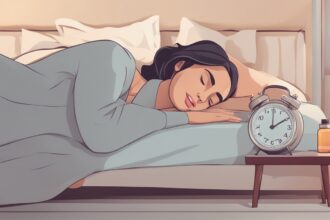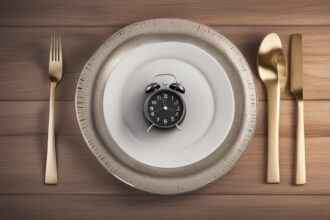Have you ever wondered how your fasting routine might be affecting your sleep—or vice versa? The relationship between sleep and fasting is a fascinating one, with both practices playing crucial roles in your overall health and well-being. Whether you’re practicing intermittent fasting, extended fasts, or simply curious about how these two pillars of health intersect, understanding their connection can help you optimize your lifestyle for better energy, recovery, and mental clarity. In this post, we’ll dive deep into the science behind fasting and sleep, explore how they influence each other, and share actionable tips to harmonize these habits for maximum benefits. Let’s get started on this journey to better health!
The Science Behind Sleep and Fasting
At first glance, sleep and fasting might seem unrelated—one is about rest, and the other is about abstaining from food. However, both processes are deeply connected through their impact on your body’s metabolic and hormonal systems. During a fast, your body shifts into a state of repair and regeneration, much like it does during sleep. Fasting triggers autophagy, a cellular cleanup process, while sleep supports brain detoxification through the glymphatic system. Both are essential for reducing inflammation and promoting longevity. Research suggests that fasting can influence circadian rhythms—the internal clock that regulates sleep-wake cycles—by altering hormone levels like melatonin and cortisol. So, when you fast, you’re not just giving your digestive system a break; you’re also potentially resetting your body’s natural rhythm for better rest.
How Fasting Impacts Sleep Quality
Many people report changes in their sleep patterns when they begin a fasting regimen, especially with methods like intermittent fasting and sleep schedules that align eating windows with bedtime. For some, fasting improves sleep quality by reducing late-night snacking, which can disrupt digestion and cause restless nights. However, others might experience initial challenges, such as hunger pangs or low blood sugar, that make falling asleep harder. A 2020 study published in the journal Nutrients found that time-restricted eating (a form of fasting) can enhance sleep duration and efficiency by syncing meals with the body’s natural circadian rhythm. The key is timing—eating too close to bedtime or fasting for too long without proper preparation can throw off your sleep cycle. Balancing your fasting window with your sleep needs is crucial for reaping the benefits.
How Sleep Affects Fasting Success
Just as fasting can influence your rest, the quality of your sleep can make or break your fasting journey. Poor sleep often leads to increased levels of ghrelin, the hunger hormone, and decreased levels of leptin, which signals fullness. This hormonal imbalance can make sticking to a fasting schedule feel like an uphill battle, as cravings and fatigue take over. On the flip side, getting enough high-quality rest—ideally 7–9 hours per night—can enhance your willpower, stabilize blood sugar levels, and reduce stress, all of which make fasting easier. If you’re struggling with hunger during a fast, take a look at your sleep habits. A consistent bedtime routine might be the missing piece to your fasting and better sleep puzzle.
Practical Tips to Optimize Sleep While Fasting
Aligning your fasting and sleep routines doesn’t have to be complicated. With a few adjustments, you can create a synergy that supports both practices. Here are some practical strategies to help you improve sleep during fasting and ensure you wake up feeling refreshed and ready to tackle your day:
- Time Your Eating Window: Try to finish your last meal at least 2–3 hours before bedtime. This gives your body time to digest and prevents discomfort or acid reflux that can disrupt sleep.
- Stay Hydrated: Dehydration during a fast can cause headaches and fatigue, which affect sleep. Sip water throughout the day, but taper off in the evening to avoid frequent bathroom trips at night.
- Include Sleep-Friendly Foods: When you break your fast, opt for foods rich in tryptophan (like turkey or bananas) or magnesium (like nuts and leafy greens) to promote relaxation and better rest.
- Avoid Caffeine Late in the Day: If you’re fasting, you might rely on coffee to curb hunger, but consuming it too late can interfere with your ability to fall asleep. Stick to morning or early afternoon doses.
Common Challenges and How to Overcome Them
While combining fasting with a healthy sleep routine offers numerous benefits, it’s not without its hurdles. Some people experience insomnia, irritability, or low energy when they first start fasting, especially if their body isn’t used to the change. These issues often stem from improper timing, nutrient deficiencies, or stress. Let’s address a few common challenges related to fasting and sleep quality and how to navigate them effectively:
- Hunger Keeping You Awake: If hunger pangs are disrupting your sleep, try drinking herbal tea or a small glass of water with a pinch of salt to balance electrolytes before bed.
- Low Energy During the Day: Fasting can sometimes cause fatigue, especially if you’re not sleeping well. Prioritize naps or short rest breaks to recharge without breaking your fast.
- Stress and Cortisol Spikes: Fasting can temporarily increase cortisol, a stress hormone that disrupts sleep. Practice relaxation techniques like deep breathing or meditation before bed to calm your nervous system.
Long-Term Benefits of Aligning Sleep and Fasting
When you master the balance between sleep and fasting benefits, the long-term rewards are impressive. Consistent fasting paired with quality sleep can improve insulin sensitivity, support weight management, and enhance cognitive function. Over time, you might notice better mood stability, as both practices help regulate serotonin and other neurotransmitters. Additionally, syncing your fasting schedule with your natural sleep-wake cycle can strengthen your circadian rhythm, leading to more predictable energy levels throughout the day. It’s a holistic approach to wellness that goes beyond just diet or rest—it’s about creating a sustainable lifestyle that supports your body’s natural processes.
In conclusion, the interplay between sleep and fasting is a powerful tool for transforming your health. By understanding how these two practices influence each other, you can make informed choices to enhance both your fasting results and your sleep quality. Whether you’re new to fasting or a seasoned pro, small tweaks—like adjusting your eating window, prioritizing rest, and managing stress—can make a world of difference. Remember, health isn’t a one-size-fits-all journey. Experiment with these tips, listen to your body, and find the rhythm that works best for you. Here’s to better sleep, successful fasting, and a healthier, more energized you! What’s your experience with fasting and sleep? Drop your thoughts or questions below—we’d love to hear from you!






